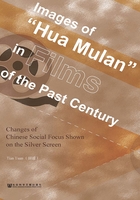
Chapter 2 The Singing of Patriotism:Mulan Joins the Army (1939)
Mulan Joins the Army,which is directed by Bu Wancang (1903-1974),is based on the script written by E.C. Ouyang (1889-1962). The film features a girl’s legendary military experience in ancient China,who replaces her ailing father in the army and fights for the country. During this process,she meets Liu Yuandu,a loyal companion who later becomes her husband. They work together investigating the enemies’ movements and struggling against the evil military adviser,a series of activities which ensure their final success of the battle. After the war,they both refuse the emperor’s offer for high positions and go back home to get married. This film established a box office record in 1939 for consistent showing for 85 days in Shanghai.[1] Its success,as Poshek Fu notes,“initiates a new cycle of costume films,which lasts until the end of 1940s”.[2] All these achievements are gained out of the film’s successful combination of the ancient girl’s abnormal military experience with the concurrent social affairs,that is,the anti-Japanese war. It expresses a strong desire to call on the public to drive away the Japanese intruders by speaking high of the patriotic activities of the heroine and hinting that people who are loyal to the country and can sacrifice everything for it can get good endings.
Being the core elements of a movie,the theme,better than others,reflects the director’s or scriptwriter’s intentions. Each target movie of this study has its own feature on adapting The Ballad of Mulan as they melt their varied social factors into film production. Mulan Joins the Army,in particular,praises patriotism and expresses a strong desire to get rid of the enemies with its wartime background. This theme influences the structure of the plotline which adds,more than other two films,military elements to the original text. On depicting the characters,the film also tries to reflect and influence current social facts. The heroine is figured as a qualified solider being brave and clever. She can always defeat her enemies which are used to mimic the barbaric Japanese intruders. All these additions and changes intend to foment a revolution in the audience’s taste and reception—besides commercial pursuits,Mulan Joins the Army sets more eyes on the responsibilities of citizens during wartime. In so doing,this film,just like Laurence Oliver’s Henry V (1944) which was also made during the Second World War,helps promote the development of wartime nationalism.